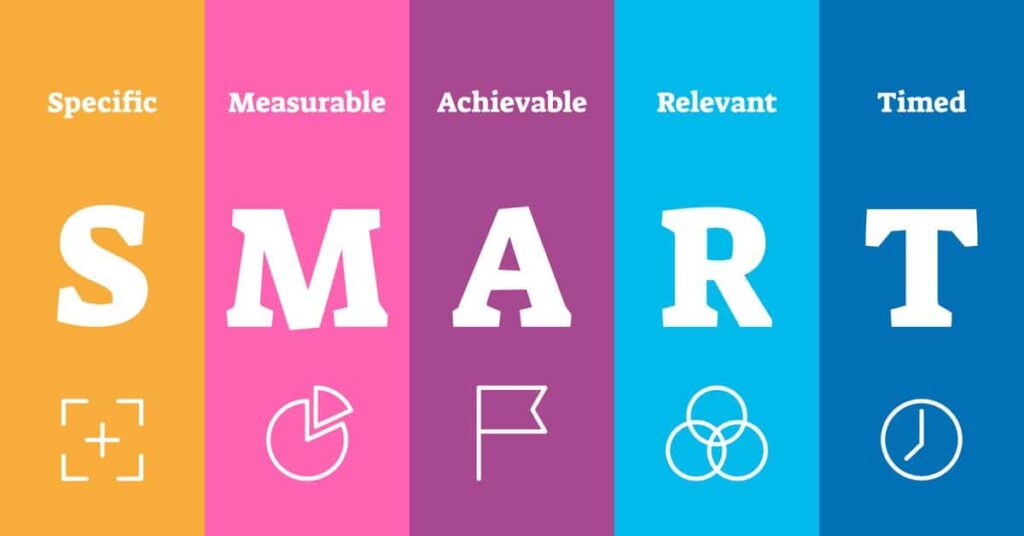Introduction To Goal Setting Theory
As the new year approaches, we often find ourselves thinking about the things we want to accomplish and the changes we want to make.
Setting goals can be a great way to give ourselves direction and motivation, and Goal Setting Theory can help us do it effectively.
If you’re looking for a way to stay motivated and focused on achieving your goals in the new year, the goal-setting theory may be just what you need! But before we dive into how it can help you, let’s take a closer look at what goal-setting theory is and how it works.
What Is The Goal-Setting Theory?
Goal setting theory is a psychological theory that explains how people set and work towards specific personal goals.
It can be a powerful tool for helping us stay motivated and focused on our aspirations. If you have ever struggled with goal setting in the past and found it hard to stick to the goals you want to achieve, then the goal-setting theory is for you.
According to goal-setting theory, several key factors influence the effectiveness of goal-setting, including clarity, difficulty, feedback, commitment, and self-efficacy.
By setting specific, challenging goals and tracking our progress towards them, we can increase our motivation, focus, and performance and ultimately achieve our desired outcomes.
This can be especially helpful as we embark on the new year and look for ways to make positive changes in our lives.
Whether we are seeking to improve our personal lives, advance our careers, or create a positive impact in our communities, goal-setting theory can help us stay motivated and focused on the things that matter most to us.
Who Created The Goal Setting Theory

Edwin Locke first developed the goal-setting theory of motivation in 1968. Locke suggested that when an individual sets a specific, difficult goal and is given feedback on their progress, they will be more motivated to achieve the desired outcome
The theory has since been studied extensively and has become one of modern psychology’s most widely accepted motivation theories.
It has been used to help individuals and organizations achieve their goals in various settings, including corporate, educational, health care, and sports.
Now that you know the basics of goal-setting theory, we’ll look at how you can use it to stay motivated and focused on achieving your goals in the new year.
Benefits of Goal Setting Theory
The Benefits of Setting Specific, Challenging Goals
Setting specific, challenging goals has several advantages. It can increase motivation and focus, as individuals have a clear target to work towards and can track their progress towards achieving it.
Placing challenging goals can also improve performance and outcomes, as individuals are more likely to put in the necessary effort to achieve them.
Moreover, achieving these goals can lead to greater satisfaction and accomplishment, as individuals feel a sense of pride and achievement. Research has shown that setting specific, challenging goals can lead to higher levels of productivity, better problem-solving skills, and increased self-confidence.
The Key Factors of Goal-Setting Theory
There are five key principles of the goal-setting theory that can influence the effectiveness of goals. These principles include:
Clarity
Goals should be clear and well-defined rather than vague or general. This helps individuals stay focused on what needs to be done and makes it easier to track progress towards achieving goals. Setting Vague goals will get you nowhere, so take your time and really refind the goals you want to achieve.
Challenge
Goals should be challenging but possible to achieve. Setting a goal that is too easy may not provide enough motivation, while setting a goal that is too difficult may lead to frustration and demotivation. An example of a challenging goal might be trying to learn a new language in a couple of months; A more achieved goal that is still challenging would be to learn the basics of a language in 8 months. Specific and challenging goals are the type of goals we want to set.

Commitment
Individuals must be committed to their goals in order to stay motivated and focused on achieving them. This includes setting clear goals and making a plan for achieving them, as well as being willing to put in the effort and make sacrifices as needed. Goal commitment is crucial when it comes to reaching your goals; we will discuss ways you can maintain motivation and commitment to your goals shortly.
Feedback
Regular feedback on progress towards goals can help individuals stay motivated and make necessary adjustments to their efforts. Feedback can be provided by peers, mentors, or supervisors and should include both positive reinforcements for progress as well as constructive criticism for areas where improvement is needed.
Task complexity
The complexity of the tasks involved in achieving a goal can also influence its effectiveness. Goals that involve complex tasks may require more effort and resources but can also lead to greater satisfaction and accomplishment upon completion. Overcoming a complex task can also do wonders for your self-confidence and can induce intrinsic motivation in wanting to continue the goal-setting process. When you prove to yourself that you can overcome hard things, you are more likely to continue tackling difficult goals.
Goal Setting Theory – The SMART Goal Method

One simple yet effective way to get started with implementing goal-setting theory is to use the SMART goal-setting method.
SMART is an acronym that stands for Specific, Measurable, Achievable, Relevant, and Time-bound.
Specific: Set goals that are clear and targeted rather than hazy or all-encompassing.
This makes it simpler to track progress towards the objective and helps people keep focused on what needs to be done.
Measurable: Goals should be measurable in order for people to monitor their progress towards realising them. Setting precise benchmarks or metrics to gauge success may be necessary.
Achievable: Goals should be difficult to reach but still attainable. While setting a goal that is too challenging could result in irritation and demotivation, setting a goal that is too easy might not provide enough motivation.
Relevant: Goals should be relevant and aligned with an individual’s values, interests, and long-term aspirations. This helps ensure that individuals are motivated and committed to achieving them.
Time-bound: Goals should have a specific time frame for completion, which helps individuals stay focused and motivated.
This also helps to ensure that goals are achieved within a certain timeframe.
By following the SMART goal-setting method, individuals can set achievable and meaningful goals that will help them reach their desired outcomes. However, setting the right goals is only half of the battle; staying motivated and committed to achieving them is the other half.
Goal Setting Theory – Maintaining Motivation
How To Maintain Motivation And Accountability
Motivation is key when it comes to goal-setting and achieving objectives. Here are some tips to help you stay motivated:
Breaking Goals Down Into Smaller Tasks
Although the principles of the goal-setting theory seem great on paper, it’s easy to get carried away and set unrealistic expectations for ourselves, which can quickly lead to feeling overwhelmed and ultimately cause our goals to fall through.
This can be incredibly frustrating when we don’t see the progress we were hoping for and end up putting our goals on hold until “next year” or some other indefinite time in the future.
So what do we do when faced with this common scenario? The solution is to break it down into smaller, more manageable chunks or tasks, also known as the process of chunking.
Chunking is a way of breaking down a significant goal into smaller, more manageable tasks to stay motivated and progress towards achieving the goal.
This technique has several benefits, including increased motivation, focus, and a sense of accomplishment. It also helps individuals track their progress and develop problem-solving skills.
To chunk your tasks and create a list, here’s what you can do:
- Define your goal: Clearly define your overall goal and what you want to achieve. This will help you stay focused and motivated as you work towards achieving it.
- Break your goal into smaller tasks: Divide your goal into smaller, more manageable tasks or chunks. These tasks should be specific, achievable, and aligned with your goal.
- Prioritise your tasks: Decide which tasks are essential or must be completed first. This will help you stay focused and avoid feeling overwhelmed by too many tasks.
- Create a schedule: Determine how much time you have available to work on your tasks and schedule time in your calendar to work on them. This will help you stay organised and ensure that you have dedicated time to work towards your goal.
- Track your progress: As you complete each task, mark it off your list or check it off your calendar. This will help you stay motivated and see the progress you are making towards achieving your goal.
Surround Yourself with Positive People who Support Your Goals
Another way to stay motivated and accountable is by finding an accountability partner or joining a community of like-minded individuals. Having someone to check in and share your goals with can help you stay on track and motivated to achieve challenging goals.
Finally, set small rewards for yourself as you complete each task or reach certain milestones. This can help you stay motivated and celebrate your progress along the way.
Reward Yourself For Achievements
Reaching a goal can be difficult, and it’s important to reward yourself for your hard work. Acknowledge each step that you take towards your goal, no matter how small. Celebrating each milestone can be a great motivator and helps to build momentum as you work towards achieving your goal. Rewards can be anything from a night out with friends, buying yourself something you wanted, or simply taking the time to appreciate how far you have come.Using these tips, setting realistic goals, and staying accountable, you can stay motivated and reach your goals in no time.

Remain Flexible and Adjust Your Approach If Needed
No matter how much planning and preparation you do, things don’t always go as planned. You may run into unexpected challenges or changes in circumstances that make it difficult to reach your goals.
It’s important to remain flexible and adjust your approach if needed. If a task turns out to be more challenging than expected, take a step back and reassess the situation. Ask yourself what you can do differently or if there is another approach that might work better.
You should also be mindful of how you deal with setbacks and try to stay positive and keep going. Remember that setbacks are part of the learning process and can help you reach your goals more effectively.
Goal Setting Theory – Examples
Examples of Goal Setting in Personal Development
We all have areas of our lives that we want to improve, and setting personal development goals is a great way to work towards becoming the best version of ourselves.
These are some general examples of how to implement goals for personal development in your life:
- Improve your physical health by committing to a regular exercise routine and eating a healthier diet.
- Build stronger relationships by actively listening to others and expressing your feelings more openly.
- Enhance your communication skills by taking a public speaking course or joining a local meetup group.
- Boost your confidence by setting small goals and celebrating your progress along the way.
- Develop a new skill or hobby, such as learning a new language or instrument.
- Improve your mental health by finding ways to manage stress and practising self-care.
- Increase your productivity by setting clear goals and prioritising tasks.
- Find work-life balance by setting boundaries and making time for relaxation and leisure activities.

Goal Setting Theory – Examples
Goal Setting In Education
Achieving success in school or university isn’t just about hitting the books – setting goals and crushing them is key to making progress and feeling accomplished.
Some examples of specific and achievable educational goals can include the following:
- Improving your grades – aiming for a B or higher in all subjects.
- Learning a new subject – choosing a new topic that interests you but is challenging. E.g. coding, cooking, textiles
- Improve time management skills – Create a realistic study schedule and stick to it. If you want to learn about how to optimise your study routine, click here.
To reach these educational goals, here are some tips to keep in mind:
- Identify which classes or subjects you need to focus on to improve your grades.
- Set aside dedicated study time for each class or subject, and create a study schedule that works for you.
- Find a study group or ask for help from your teacher or a tutor if you struggle with certain concepts.
- Stay on top of assignments, and make sure to turn in all of your work on time.
- Determine your learning style and find resources that cater to it (e.g. online tutorials, textbooks, videos).
- Find a mentor or join a study group to help you stay motivated and on track.
Goal Setting Theory – Examples
Examples of Goal Setting in the Workplace
Goal setting in the workplace is crucial for helping us achieve success and advance in our careers. It allows us to identify specific, achievable objectives and work towards them in a structured and organised way.
Some examples of work-related goals include increasing productivity, improving communication skills, developing new skills, taking on more responsibility, and advancing in your career. If you are a boss or hold a manager position, I encourage you to share this blog with your colleagues; following this goal-setting process can do wonders for employee motivation and overall job performance.

To crush these goals and achieve new heights in your career, consider the following tips:
- Take the time to consider where you want to go in your career and set long-term goals to help you get there.
- Keep your manager or supervisor in the loop by communicating your performance goals and how they align with the organisation’s goals.
- Break your goals down into smaller, more manageable tasks and create a plan to stay on track.
- Set deadlines for each task and track your progress regularly to see how you’re progressing.
- Seek opportunities for professional development and ask for feedback from your manager or colleagues to help you grow and improve.
- Don’t be afraid to take on new challenges and additional responsibilities – it’s a great way to show initiative and build your skills.
- Remember that it’s okay to ask for help when needed – no one becomes an expert overnight!
Remember to set specific, challenging goals aligned with your values and long-term aspirations, and use the SMART goal-setting method or the five factors of goal-setting theory to help you stay on track and achieve ultimate job satisfaction.
Conclusion
In conclusion, goal-setting theory is a great way to stay motivated and focused on what you want to achieve.
Whether you’re looking to improve your personal life, education, or career, setting specific, challenging goals that align with your values and long-term aspirations can be a powerful tool for staying motivated and on track.
With tools like the SMART goal-setting method and the five factors of goal-setting theory, you can ensure you achieve all the goals you aspired to. So as we start the new year, think about what you want to achieve and use goal-setting theory to help you stay motivated and focused on reaching your goals. Good luck!
You Might Also like: (H3 Format)
If you enjoyed reading about Goal Setting Theory, you might also be interested in the following:

